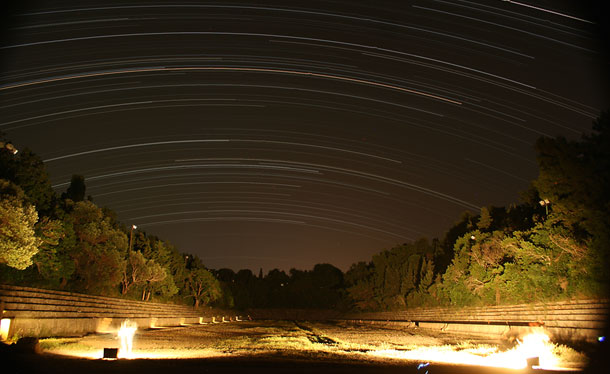
Time exposure of the ancient stadium on the acropolis of Rhodes, the Greek island where British horoscope master Patric Walker lived much of the year. According to Sally Brompton, who once got the assignment, he would send his students there to commune with the gods. Photo by Anthony Ayiomamitis.
Dear Friend and Reader:
Horoscopes are a writing form that’s close to my heart for two reasons. One is that reading the Patric Walker column in The New York Post in the early 1990s was the first demonstration to me of how relevant astrology could be. I knew astrology existed, and I knew astrologers, but I did not see the point of doing it. Patric’s daily column, nested in with Jumble on the Post’s comic page, was not merely accurate; he offered some of the most sage insights I’ve ever heard from an astrologer, to the present day.
One day in 1994 I could no longer stand the mystery of how he did it, so I ventured to figure it out. Using an ephemeris (to look up the positions of the planets) and a deck of Crowley tarot cards (to illustrate the energies), I camped out in my then-girlfriend Hilary’s bed and cracked the codes not just of writing astrology columns, but also into the top level of an industry where very few people ever get — writing horoscopes for the London tabloids.

The Chironian, an abandoned mine nice enough to live in, once part of the Norton Cement Works, where I did many rituals and spent hours communing with the deep Earth and its elemental spirits during the spring and summer of 1995. Photo by Eric Francis.
Horoscope writing in England is another world compared to the United States. Instead of syndicated columns, every major newspaper has its own horoscope writer, who becomes one of the voices of that publication.
Jonathan Cainer is one of the best-known horoscope writers in England, and many years ago he adopted me as his vacation stand-in. For four years I got a taste of the big time, even writing in some of the same newspapers where Patric Walker had appeared. It was quite a trip having millions of readers of newspapers in Australia, England and Europe, and worldwide on the Internet. It was clearly Jonathan who put me on the larger map; he has always had a thing for making sure people discovered younger astrology talent. I met Jonathan with the help of my old friend William Lilly (1602-1681), but that is another story.
Many ‘proper’ astrologers look down on newspaper horoscopes for a variety of reasons, and some go so far as to say that they are destroying the image of what is otherwise a legitimate profession. My take is that with astrology, interpretation is where the tires meet the highway, especially when it’s raining. The horoscope column is an example of just that — an interpretation designed to be relevant to a person, right then, right when they seek it out. People need astrology to offer them an idea, a strategy or some reassurance. If astrology cannot do that, what good is it?
Horoscopes are also my literary love because when I started writing them, I was looking for a way to do journalism that was more relevant than what I was doing at the time, which was investigative reporting on fraud cases involving toxins and very large corporations.
No matter how accurate or damning my investigative articles were, they did not seem to be making contact with the people who needed the information the most. It occurred to me that a well-written horoscope could be a way to make contact with the softer side of humanity, and a place to move information you might not see anywhere else, certainly not in a newspaper.

House on Binnewater Lane in Keators Corners, Rosendale, New York (on the site of the former Norton Cement Works) where I wrote my first horoscope column (upstairs on the right) in April 1995.
It was Patric, a venerated British astrologer, whose writing taught me the rudiments of astrology and set up the model I use to translate from the chart to the message I offer you. And it was from Patric that I learned that a horoscope must be written to an individual, not to a group. You don’t write to all the Geminis who are reading — you write that horoscope to the one who is reading.
That takes confidence, and an experienced writing voice, and it also builds the confidence of the reader. The horoscope is part of an ongoing relationship between a reader and an astrologer. It’s a meeting place and a space to share ideas. I intend for mine to be relevant even if a person reading does not believe in astrology. All writing, I believe, must stand on its own merits.
This week’s edition comes with Planet Waves Weekly #1000. The number on top of each Friday horoscope is a sequence number, so that we can tell the columns apart (we also identify them by the first few words of Aries). When I hired Jessica Keet to serve as my horoscope coordinator and proofreader in 2004, I made an estimate and started the sequence at #531. Arriving at 1000 is not an absolute count, but it’s close and probably an underestimate.
Since I started my column in 1995 — as The Navigator, first appearing in Free Time magazine in Poughkeepsie, New York — I’ve written in daily, weekly, twice-monthly, monthly, quarterly and numerous different annual formats. I’ve written my column in many regions of the United States, as well as in Belgium, Canada, England, France, Germany, Greece, Netherlands, Sicily and Spain (and on many trains and airplanes on the way to those places).
Shortly before I started writing horoscopes, someone named Laurie Burnett (who I met through a classified ad in The Mountain Astrologer) suggested that I look into something called Chiron, a newly discovered planet. She also suggested that I spend some time with a book called Esoteric Astrology. One day she mailed me her tattered copy, minus its cover, and slowly I started to dip into its at-first strange concepts. While I was living in Germany in 1998, I got my own copy and studied it cover to cover in preparation for writing this article, about the 1999 grand cross and total solar eclipse.
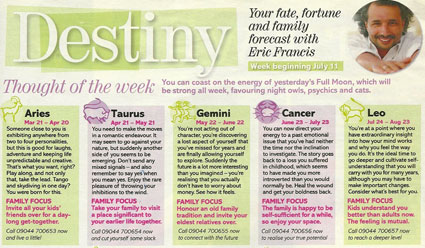
Planet Waves appears in one of its many incarnations as the Destiny horoscope, in the leading British magazine “Woman.” The thought of the week is about how the Full Moon will favor psychics, night owls and cats.
As for Chiron. When I started to go deeper into my study of astrology, using a diversity of classic texts by people like Isabel Hickey, Rob Hand and the writing team of Louis Acker and Frances Sakoian, I knew that astrology was not making sense presented in textbook format. Memorizing (for example) the different values of placements like Venus through the signs was not giving me any sense of the whole.
Then I started reading about Chiron and halfway through my first book, all of astrology made sense in a new way — an integrated way. This went beyond the conceptual right to a direct connection with astrology as it works. Astrology, as anyone who has studied it knows, can be an intellectual morass. The concepts need to be sorted out and understood, but ultimately interpreting the aspects is an intuitive art, like composing music.
As I studied Chiron, I knew I was in the domain of new planet research, on the cusp of a new era. I devised a way to work with my clients — by asking them about their past Chiron transits, rather than immediately telling them what their chart supposedly meant. This revealed how transits work in the context of a person’s life, and how a person’s chart unfolds and reveals its layers through experience, over time. Then I would read the chart.
When I was living in Germany in 1998, I learned that there were a diversity of other newly discovered planets, including Pholus, Nessus and 1992 QB1, and I began looking into those. That process put me in touch with Chiron pioneer Melanie Reinhart, who I adopted as a mentor. I also met and studied with Robert von Heeren, co-author of the only book on Pholus.
From early on, I was curious about the asteroids, so I started reading books by Martha Lang-Wescott. I contacted her and adopted her as a mentor. I have a lot of Chiron in my chart, and mentorship is one of its key themes. As I identified competent astrologers, I would make contact with them and found them to be generous with their knowledge, among them Rob Hand, David Arner, David Solte, David Roell (a lot of Davids), Dale O’Brien and others. I never took a formal course of study; I just made a habit of finding people I thought had something going on and engaged them in a dialog, often lasting years.
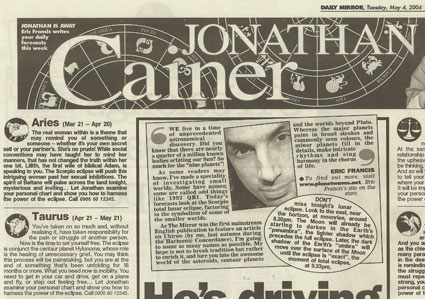
Planet Waves appears in The Daily Mirror of May 4, 2004, standing in for British horoscope writer Jonathan Cainer. It’s really been 10 years?
The Planet Waves horoscope became a fusion of horoscope writing in the classical British style, as well as a forum to bring in what I was learning about the minor planets and from my experiences working with clients. I have incorporated everything I learned from my therapist Joseph Trusso.
Part of what makes my column distinctive is that I apply many details of what I have learned from observing my clients’ transits, as well as what I learned in therapy and in spiritual practice and training.
That most horoscopes aren’t so helpful is not the fault of the horoscope format itself. Those who write them need to have trust in what they’re doing, plus a vision and a sense of mission — otherwise the whole thing falls flat. But when it works, it works brilliantly, and I think the potential of the horoscope column is vastly underdeveloped. As I have said and will keep saying, the astrological profession needs to take this seriously, horoscope writing needs to be taught at conferences, and the very best horoscope writers need to be put forward into the most visible positions — because they are the ambassadors of astrology to the widest public available.
The Internet has made it much easier for people to start a horoscope column; all you need is a blog. If this field is brimming with talent, I have not encountered it yet and would be grateful to be introduced to those who my readers consider the better writers.
Yet thanks to the Internet, we have more space to work. The format of the Planet Waves horoscope I offer you here is not constrained by an absolute word count. A printed horoscope column of 1,200 words or 100 words per sign is considered long. In this format I take up to 180 words per sign if necessary, longer for the monthly. This gives me the space to develop more complex themes.
A Personal Form of Journalism
When I say that I consider my horoscope a form of journalism I really mean it. For one thing, it started in newspapers, so it’s journalism by default. I started in newspapers as well. I came to the work with many years of experience writing about issues that are extremely difficult to explain and even more difficult to show as relevant.
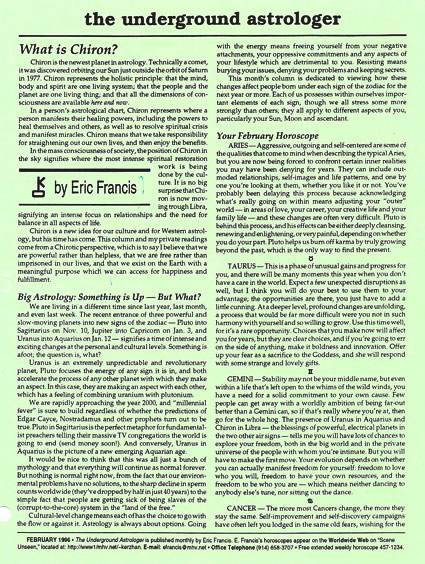
The Underground Astrologer, an early incarnation of Planet Waves, which was distributed in cafes around the Hudson Valley of New York. Even in this early form, the column has the essay plus horoscope format. This seems to be from February 1996, right before being picked up by Chronogram magazine, where I’ve been publishing continuously 17 years.
The horoscope is a space where I can apply anything I’ve learned and synthesize it with the unique, immediately occurring positions of the planets, and get the news out fast. It’s a mode of journalism that is actually relevant to the people who are reading it.
That’s a cool invention — a way to deliver up-to-the-day psychological and spiritual information, packaged as a form of inner news. I have often joked that the horoscope is the most accurate part of a newspaper. What I did was start from the horoscope and reinvent the whole concept of news.
One quality of the Planet Waves horoscope is that wherever I can arrange it, it appears with a news and astrology commentary column — that’s the bit you’re reading now. Not everyplace can accommodate this, but I negotiate it where I can. I consider the accompanying article to be an essential complement to the horoscope because it grants wider context and the ability to take subjects in-depth. It also reveals something that many people don’t know about — how astrology can be used as a way to observe, analyze and reflect on world events, on the movement of history and how we as individuals are involved in things much larger than ourselves.
The point of view of the horoscope column is distinctly personal. It must be written in a way that bypasses political prejudices and spiritual beliefs. It must address people who are having an awesome day and be sensitive enough to reach those who are having a horrible day. This is a fine line to walk, and it obviously precludes being either overly optimistic or in any way pessimistic in my horoscopes. Yet they still must convey a feeling of advocacy and demonstrate a measure of understanding. I recognize this not an easy form of writing to teach, though I believe it can be done.
The article that accompanies the horoscope is designed to take a wider scope, and to venture into controversial territory when necessary. Yet when I write about the news in this format, that too is kept to a scale where it’s personally relevant. The great failing of the news as we know it is that for the most part, it’s irrelevant. It may have impact; some events are too vast or tragic not to feel. Yet it almost always lacks actual meaning in an individual person’s life.
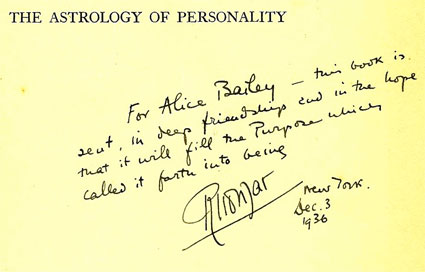
So with the Planet Waves column, I turn the news inside out and strive to show the connection. Astrology happens fast and news happens fast, and it’s possible to combine them in a way that’s both exciting and that teaches us all something about the world, about ourselves and about how the planets describe human affairs.
I work with the common ground that people share with major events and newsmakers — we all have the same planets in our charts. We are all in some way synchronized with the cosmos, even if that experience is rough at times. I believe that using astrology can help smooth the way, and at least can provide some meaning where it might have been lacking before.
A few years ago, an old book fell into my lap. It’s a first edition copy of The Astrology of Personality by Dane Rudhyar, published in 1936. Rudhyar, by the way, is considered the inventor of the 12-sign horoscope column. Alice A. Bailey, who would later write Esoteric Astrology, suggested that Rudhyar write the book, and for that reason he dedicated it to her. By some miracle, I was given the presentation copy that he signed to her, dedicating it to her a second time, this time in his own handwriting on the title page.
Bailey made the book her own with a large pencil signature on the front inside cover, and by affixing the Lucis Trust Lending Library plate on the front endpaper. Reading the book, I have to remind myself that the impeccably neat pencil underscores may be those of Bailey herself. The very first one, on page 7, highlights this quote:
“What the ordinary astrologer offers to our present generation is not only far from coming up to the mental level of the intelligent thinker; it is moreover, often decidedly nefarious and psychologically disintegrating. The living astrology of all times can, however, be said to have a basic keynote: integration. And we claim that any astrology which does not bring a man a message of integration is an adulteration and a perversion of true astrology.”
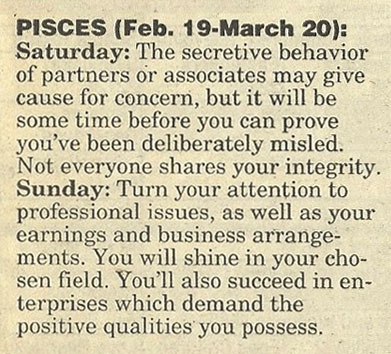
The last Patric Walker daily horoscope for Pisces, for Sunday, Nov. 12, 1995. I never figured out the Saturday horoscope, but Pluto changed signs overnight and his Sunday horoscope was the first with Pluto in Sagittarius to stay; he had the right idea.
Well now…way to sum up the intention I put into my life’s work. The chapter on the history of astrology closes with this passage, which I will share with you in full.
“Astrology must be reborn to perform again for our modern world, made chaotic by an unbridled and false individualism and by the sudden opening of psychological dams, the task of practical integration which has always been its own. Wherever the correlated motions of Sun, Moon, planets and stars are used to bring order into the confusion of our everyday world — there is astrology.
“The type and range of the phenomena of nature which astrology correlates, interprets and makes significant in terms of a cosmic principle of Order, change age after age. At first they were physiological and elemental. Now they are to be essentially psychological and mental. But the fundamental work of astrology remains the same. It is to reveal the ‘Harmony of the Spheres’ at whatever level man’s consciousness is centered. It is to carry the symbol of Order wherever man finds chaos. In modern terminology, it is the algebra of life.”
It’s funny, I have always thought of writing the horoscopes as calculus, solving the equation of the aspects in some life-affirming form. I look at the planetary pattern, align my chart for the reader of a particular sign, and work out the psychological mathematics in a way that I think is useful and motivating. It’s a lot of fun — and every time I write, I get to look at the world equally from 12 different points of view, the perfect game for a Pisces.
In that spirit, here’s to the next 1,000 horoscopes.
Lovingly,

